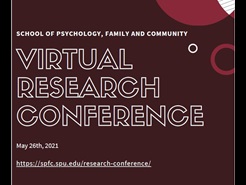God perfectionism as a mediator of non-organized religiosity and life satisfaction.
This poster was also presented at Western Psychological Association, May 2021
Description
Non-organized religious activity is performed in a private context, as opposed to organizational religious activity such as attending church. The present study evaluates the effect of non-organized religiosity on life satisfaction as mediated by God perfectionism, a perception of perfectionism originating from God that can be adaptive (standards-based) or maladaptive (discrepancy-based). A parallel mediation analysis confirmed that non-organized religiosity predicted life satisfaction and indicated a significant indirect relationship between non-organized religiosity and life satisfaction, mediated by discrepancy-based God perfectionism. Non-organized religiosity also predicted lower discrepancy-based God perfectionism, which in turn predicted lower life satisfaction. Implications include a basis for future interventions to reduce negative God perfectionism and subsequently improve wellbeing.
God perfectionism as a mediator of non-organized religiosity and life satisfaction.
Non-organized religious activity is performed in a private context, as opposed to organizational religious activity such as attending church. The present study evaluates the effect of non-organized religiosity on life satisfaction as mediated by God perfectionism, a perception of perfectionism originating from God that can be adaptive (standards-based) or maladaptive (discrepancy-based). A parallel mediation analysis confirmed that non-organized religiosity predicted life satisfaction and indicated a significant indirect relationship between non-organized religiosity and life satisfaction, mediated by discrepancy-based God perfectionism. Non-organized religiosity also predicted lower discrepancy-based God perfectionism, which in turn predicted lower life satisfaction. Implications include a basis for future interventions to reduce negative God perfectionism and subsequently improve wellbeing.


